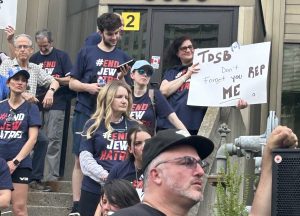As of Monday, May 10, three Orthodox day schools are closed for classes as well as religious services following stricter new orders from Toronto Public Health (TPH) limiting in-person attendance of students at schools.
Yeshiva Yesodei Hatorah on Glen Rush Boulevard is closed “even for religious services. Only our day care remains open, with our special needs program. All this is in compliance with newest (Section) 22 order,” Binyamin Septon, the yeshiva’s executive director, wrote to The CJN. “There is no intention to stay open in breach of the order.”
The yeshiva and two other Orthodox day schools, Bais Yaakov Elementary School on Saranac Boulevard and Bais Yaakov High School on Lawrence Avenue West, were reported to TPH last month by Toronto city councillor Mike Colle (Ward 8, Eglinton-Lawrence) for alleged violations of COVID restrictions, following complaints from constituents of steady streams of students and cars arriving and leaving.
At the time of Colle’s complaint to TPH on April 12, both girls’ schools said they were closed for in-person teaching but open for religious services. At the elementary school, morning prayers ended in some cases at 2 p.m.
On May 6, TPH announced it was beefing up existing regulations, to take effect on May 10, in what appeared to be a move to close the loophole for religious services.
The newest order under Section 22 of the Health Protection and Promotion Act is aimed at stopping “school-aged children from congregating indoors, in enclosed spaces, for extended periods, on a regular basis.”
The order applies to “all persons, including corporations, providing education to school-aged children, regardless of whether or not they qualify as a school within the meaning of the Education Act.”
Although religious services are not specifically mentioned, the order says it is needed to address “other types of student gatherings” that do not qualify as teaching or instruction.
Violators face fines of $5,000 for individuals and $25,000 for corporations for every day or part of a day on which the offence occurs or continues.
In a statement to media, Yeshiva Yesodei Hatorah said it is “disappointed by the imposition of a city order that will curtail the ability of our school-aged children from attending religious services and practices. We will abide by provisions that require school facilities to close for school-aged children, as we have done in the past with previous restrictions and guidelines. We are currently reviewing our legal options.”
At Bais Yaakov High School, an administrative assistant who answered the phone refused to say whether the school was closed for religious services.
However, a source told The CJN that both Bais Yaakov schools are closed for classes and religious services, and that everything is virtual for the moment.
In an email to The CJN, which inquired specifically about the three Orthodox schools, TPH said that over the last four weeks, it had received several complaints “suggesting that a number of educational settings were hosting in-person attendances of school-aged children.”
The new regulations place “further restrictions on when school-aged children can attend school premises or other educational settings.”
Also last month, UJA Federation of Greater Toronto announced it had suspended its partnership with a local Jewish day school for continuing to operate in-person classes in violation of COVID restrictions.
UJA is still declining to name the school, which is subject to a freeze in funding and support services.
At the same time, two prominent Orthodox leaders, Rabbi Daniel Korobkin of Beth Avraham Yoseph of Toronto Congregation in Thornhill and Rabbi Chaim Strauchler of Shaarei Shomayim Congregation, wrote a letter to congregants imploring them to obey government and medical rules on COVID because they override almost all halakhic concerns.







